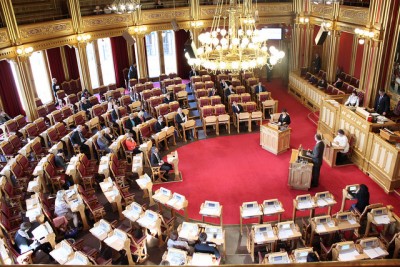NEWS ANALYSIS: Flags were flying in downtown Oslo and both Norwegian politicians and journalists dressed unusually well on Wednesday. It was time for the highly ceremonial opening of an entirely new session of Parliament (Stortinget), with new faces and new politics but questions nonetheless over where Norway’s political power really lies.

With a new non-socialist minority government coalition taking over from the outgoing left-center coalition that had a majority in Parliament, there’s been lots of talk that political power will now return to the floor of the Norwegian Parliament. Outgoing Labour Prime Minister Jens Stoltenberg could count on a majority from his coalition’s three parties during the past eight years, meaning that most all of the government’s proposals could win parliamentary approval. Incoming Prime Minister-elect Erna Solberg from the Conservatives won’t have that advantage.
Now her new two-party non-socialist government formed with the Progress Party will need to win support for their proposals from either the two other, much smaller, non-socialist parties in parliament or from opposition parties. That’s led the small centrist parties to feel like they now have some real power, since they can provide the swing votes on everything from whether the new government really will be able to cut subsidies to farmers and some newspapers, let municipal governments keep more of their own tax revenues instead of having to share them with poorer municipalities, or even raise speed limits on Norwegian multi-lane highways. These are among the many issues that neither the non-socialist “support parties” (the Liberals and Christian Democrats) actually support, so they can torpedo the government’s plans.

Members of Parliament in Norway have long clung to a tradition of “all makt i denne salen,” literally, that all power in Norway lies on the floor of Parliament where votes are taken. The Conservatives and the Progress Party will have to rule in line with support from the MPs.
But there’s another reality that political commentator and former Brussels correspondent for newspaper Dagens Næringsliv (DN), Kjetil Wiedswang, pointed out in a column earlier this week: Norwegian voters have in fact outsourced much of their democracy far from the halls of the Storting, to the halls of the European Union (EU) and European Parliament, where they have no representation.
That’s because they have twice refused to join the EU but still must adhere to EU rules and regulations, through the so-called EØS-avtale (European Economic Agreement) in order to be able to trade with the EU.
And that means that not only will many of the new laws and regulations sought by Norway’s new government need to conform to EU rules, many other laws will be imposed on Norway over which neither Prime Minister-elect Erna Solberg of the Conservatives, her new government co-leader Siv Jensen of the Progress Party, the rest of the government nor the opposition in Parliament will have control.
Given up power to the EU
While the Norwegian politicians gathered with King Harald V in Oslo on Wednesday, members of the European Parliament were gathering in Strasbourg. They were voting this week on a variety of issues, from requirements to place even bigger health warnings on packs of cigarettes to how international money transfers should be handled in the wake of alleged spying on them by US officials. The European legislators will also be deciding work rules for airline pilots and immigration policies in the wake of the mass drowning of desperate immigrants off Lampedusa.
All of this will affect Norwegians, but Norwegian politicians don’t have any say since they’re not members of the European Parliament. “Never in any other democracy, anywhere, ever, have politicians voluntarily given up so much power to higher national bodies where they have no representation themselves,” wrote Wiedswang, who’s authored books on the EU and follows it closely. When the new EU laws need to be approved and applied in Norway, he wrote, “the Storting will club through most of them, resigned to their lack of power.”
More ‘Europe-friendly’
That’s worth considering when Norwegian newspapers, websites and broadcast outlets otherwise are full of reports about all the political power plays due to take place during the next session of parliament. For all the power they may think they have, the Norwegian politicians remain accountable to higher authorities that a majority of Norwegian parties (most notably the small Center Party and Socialist Left parties) have refused to be a part of. Both have also advocated dropping the “EØS” trade agreement with the EU, but that’s considered economically unrealistic. The EU remains Norway’s largest trading partner and can demand terms for doing business.
Erna Solberg, in a meeting with foreign correspondents in Oslo just before the September 9 election, said that she thinks her new government will be more “Europe-friendly” than the left-center coalition was. “We won’t have the same tension,” she said, referring to that which plagued Stoltenberg, who had to put the EU membership question on ice for eight years to maintain government unity.
The more liberal forces with Stoltenberg’s Labour Party have long favoured EU membership, as has Solberg’s Conservatives. The Progress Party’s position isn’t entirely clear, but perhaps the EU membership issue will emerge once again, and result in Norwegians getting some formal representation where much of the regional political power really lies, not just in Oslo.
newsinenglish.no/Nina Berglund

